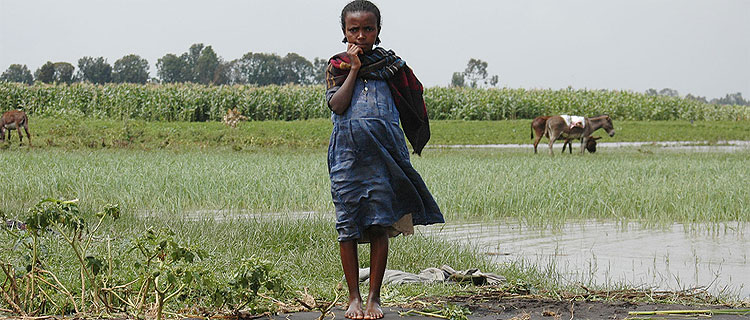
Water grabbing
A troubled Klondike
Foreign investments in Ethiopian agriculture has enormous potential, but water grabbing issues loom
Although less intensive than earlier, a foreign land acquisition surge is taken place in Ethiopia. With export restrictions and resources constraints at home, countries such as India, China, Saudia Arabia, Korea and the European Union are more extensively than before leasing land elsewhere.
Among the most attractive opportunities can be found in Ethiopia. The country itself welcomes the investments as they can unlock the enormous potential of largely untapped land and water resources. In fact, only about five percent of total blue water in Ethopia is withdrawn.
So perhaps the extensive foreign investments is exactly what Ethiopia needs? Well, there are some strong arguments for it, but let us not get carried away too much too soon. In a country where between five and seven million inhabitants require food aid, there is reasonable concern about all the food leaving the country.
And then there is the issue of access to water.
“Non-trivial portions"
In a new study published in Water Alternatives, centre PHD student Yihun Dile has together with experts from Germany, Kenya and Ethiopia analysed the potential consequences of water use from foreign investments.
Download the scientific article here (PDF)
The analysis reviewed all known agreements where foreign investors, including Ethiopian diaspora, could lease land. The information was gathered from national and regional agreements, with particular focus on the regions with most investment activity, namely Oromia, Amhara, Beneshangul Gumuz, SNNP and Gambella.
Taking into account uncertainties accompanying some of the data, Dile and his colleagues nevertheless found that if all planned investments are implemented and expanded in the near future, a "non-trivial portion" of Ethiopia's water resources will be consumed by foreign entities. That will have consequences.
"The controversy over water use in foreign direct investments is not only about quantities of water, but also about potential harm to traditional users and the long-term social, ecological and financial consequences," says Dile.
Not much help from the law
Take the Saudi Star irrigation project in the Gambela region for instance. The agricultural development company has leased 10,000 ha for rice production to export. This will divert water from a river that currently supports several livelihoods and valuable ecosystems.
With part of the land concession (1800 ha) Saudi Star will use water from a dam on the Alwero river, building a 30 km cement canal to transfer water from the river to the rice production fields. An additional dam to abstract even more water from the river is also in the planning.
The Alwero river has traditionally been used by local communities for fishing, transportation, water supply and agricultural practices. Excessive water abstraction may affect the activities of the local communities as well as the river's ecosystems.
Saudi Star has pledged to boost local job creation and engage in infrastructural development in the Gambela region, but studies done by the World Bank conclude that the job creation will be limited.
"Foreign direct investment is rapidly growing and could in principle bring benefits to local communities, but the legislations and regulations that are meant to make sure these investments will also benefit the local communities are not sufficiently enforced," says Dile.
Fair shares, please
Together with his co-authors, Dile concludes that to avoid dire social-ecological consequences for local people, access to water must be legally and practically safeguarded.
Irrigation schemes must be based on fair sharing between local farmers and foreign investors rather than the investors squeezing out the farmers with their superior bargaining power and government support.
"Put simply, water appropriation needs to be a strong consideration in future foreign direct investment," Yihun Dile says.
References
Bossio, D.; Erkossa, T.; Dile, Y.; McCartney, M.; Killiches, F. and Hoff, H. 2012. Water implications of foreign direct investment in Ethiopia's agricultural sector. Water Alternatives 5(2): 223-242
Yihun Dile is a PhD student within the project ''Water Resources and Social-Ecological Resilience in Agricultural Landscapes''. The research links global environmental change, analyses of rainfall partitioning across scales and water governance and management strategies for improved water resilience.






